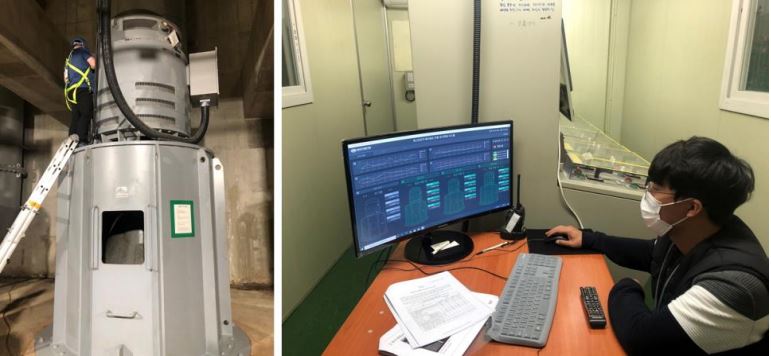
- Created2021.07.15
AI-based Diagnosis Technology in Action, from National Defense to Industrial and Public Areas
- KIMM provides safety in various fields through
AI-based PHM (Prognostics and Health Management) technology -
#1. Supporting the military’s rapid combat readiness A Republic of Korea (ROK) navy ship arrives at the dry dock of the unit maintenance depot for maintenance and drains the seawater inside the ship for land maintenance. It is at this time that an unusual vibration is detected in the drain pump. Artificial intelligence (AI)-based predictive diagnostic technology detects this vibration with a sensor and triggers a warning early on. Through this process, maintenance delays that could occur due to breakdowns are prevented, and efficient management is enabled, thus ensuring rapid combat readiness. In April, the Korea Institute of Machinery and Materials (KIMM, President Sang Jin Park) provided S/W for monitoring and diagnosing the condition of four 700 kW drain pumps that are being operated at the maintenance depot of the ROK Navy Logistics Command.
#2. Providing conditions for stable tap water supplies The water pump, a key piece of equipment in water purification and wastewater treatment plants, is a mechanical device used for circulating and supplying water. AI-based predictive diagnostic technology can detect the abnormal vibrations in water pumps early on, which could be signs of failure. This enables the stable supply of water and wastewater treatment by preventing any accidents or machine failures. In June, KIMM conducted a technology transfer of its AI-based condition monitoring and predictive diagnostic technology to ATG (Asset Technology Group) Co., Ltd., a company specializing in facility diagnostics. KIMM also supported the application of this technology to water purification/wastewater treatment plants and to other various industrial fields. Through the field use of such AI-based predictive diagnostic technology for smart water facility pilot projects in Korea, it is expected that more efficient water management can be achieved
#3. Ensuring clean air quality at subway stations Ventilation equipment, a core component of subway station facilities, includes mechanical devices that circulate and purify air at each subway station. In the instance that the motor of the ventilation system breaks down, the air quality at the station worsens, thus posing a potential health risk to individuals. KIMM installed IoT sensors that measure vibrations and currents in electric motors and developed a technology that, through AI, can autonomously conduct diagnosis by learning from big data. In February, in collaboration with the city of Deajeon and the Daejeon Metropolitan Express Transit Corporation, this AI-based diagnostic technology was applied to the Daejeon subway system at Daejeon Station, Daejeon City Hall Station, and Gapcheon Station.
When it comes to creating a safe society, ensuring the safety of the increasingly diverse and complex facilities and equipment is emerging as a social concern. The Korea Institute of Machinery and Materials has developed technology for prognostics and health management (PHM), a preventive technology that can be used to monitor the status of facilities and structures and diagnoses potential failures in advance using the Internet of Things (IoT), big data and artificial intelligence (AI).
There are various ongoing efforts in order to commercialize the AI-based PHM technology, but it is difficult to apply the technology to the actual complex industrial field. To successfully apply the technology to actual fields, starting from the development stage, it is necessary to acquire abnormal data generated in the field, analyze machine signals, and develop AI algorithms. These activities should be conducted mainly by the field-machinery experts, not the data experts. KIMM’s research accomplishment is even more meaningful as the research team succeeded in applying the technology to the actual field from the initial research stage, finding the answers from the field rather than the laboratory, and focusing on the various machinery experts.
Dr. Kyung Ho Sun, Principal Researcher at the KIMM Dept. of System Dynamics, has been at the forefront of commercialization efforts to improve safety in everyday life through the development of AI-based PHM technology that can be applied broadly across different fields including national defense, industry, and public safety
AI-based PHM technology can detect and prevent equipment failures in advance by analyzing and learning the vibration signals generated by pump and motor systems, which are all typical high energy consumption machines. By analyzing the vibration signals generated when machines are operating, this technology can be used to quickly identify signs of potential equipment failure. Furthermore, when AI and deep learning technologies are applied to PHM technology, it is possible to accurately and quickly determine which parts of these complex machines are faulty.
The KIMM research team first announced its AI-based predictive diagnostic technology in 2018 and then began its follow-up R&D for field application. In February 2021, as part of the ROK government’s Digital New Deal project, the “Project for Establishing AI Learning Data” was applied to Daejeon Panam Station in collaboration with Daejeon City and the Daejeon Metropolitan Express Transit Corporation. Other examples of the successful commercialization of this new technology include its application to Naval Logistics Command maintenance depot drainage pumps in April and technology transfer that was conducted to a specialized facility diagnosis company in June.
Dr. Sun stated that he expects that achieving faster, more accurate, and more effective diagnosis technology will be possible by integrating AI with big data gathered from numerous mechanical facilities. On behalf of his team, he expressed that they will do his best to expand the use of such technology in the field as quickly as possible, and create a safe environment free from accidents in buildings and plants, which have been occurring recently.
[List of Attachments] - Attachment: Examples of AI-based PHM technology application (Photos)
The Korea Institute of Machinery and Materials (KIMM) is a non-profit governmentfunded research institute under the Ministry of Science and ICT. Since its foundation in 1976, KIMM is contributing to economic growth of the nation by performing R&D on key technologies in machinery and materials, conducting reliability test evaluation, and commercializing the developed products and technologies.
This research was carried out as part of the “AI-based, machine system predictive diagnostic and accident response technology” project, a fundamental research project at the institute that is supported by the Ministry of Science and ICT.
Credit : The Korea Institute of Machinery and Materials (KIMM)
Usage Restrictions of Multimedia (Attachment File) : The sources of photos and research results from KIMM must be specified.
- Attachment 1: Examples of AI-based PHM technology application (Photos)

Photo description: The AI-based predictive diagnosis technology developed by Dr. Kyung Ho Sun’s research team at the Dept. of System Dynamics, KIMM, is being used to diagnose the condition of the drain pump at the dry dock of the ROK Navy’s maintenance depot.
(Left) Sensors are attached to a navy drain pump / (Right) The pump’s status is being monitored by the AI-based predictive diagnostic software at the naval maintenance depot.

Photo description: The AI-based predictive diagnosis technology developed by Dr. Kyung Ho Sun’s research team at the Dept. of System Dynamics, KIMM, is being used to diagnose the condition of motors in the ventilation rooms of Daejeon Station, Daejeon City Hall Station, and Gapcheon Station on the Daejeon City Railway.
(Left) Vibration sensor is attached to the electric motor in the ventilation room in the subway stations of the Daejeon City Railway. / (Right) The control center at Panam Station of Daejeon City Railway is monitoring the safety of ventilation equipment within the station using AI-based predictive diagnostic software.



